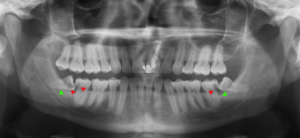The term impacted teeth indicates teeth that are not erupted and shown in the mouth (after their normal eruption time). The reason for impaction of some teeth usually is lack of space, pushing by other teeth, changes in bone,very early extraction of milk teeth in the past, irregular position of the teeth themselves or various diseases in children age. The most common impacted teeth are wisdom teeth (third molars), then the canines and premolars, and basically all teeth in the mouth. In addition, the teeth may have a variety of positions, from mild inclination (left or right) through the horizontal position and even a reverse position of the tooth (crown down roots up). If untreated, impacted teeth can lead to disruption of dental string and crowding of the teeth. Also, due to the impossibility of cleaning and keeping the plaque and food particles away from that area, there is very high risk of cavities on those teeth and also neighboring teeth, or inflammation of the surrounding tissue with pain and inability to open the mouth (trismus), bad breath, difficulty in chewing and swallowing.

